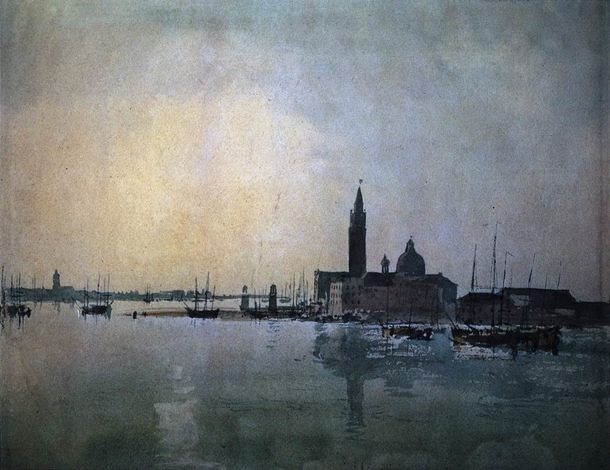
Stille in nächtigem Zimmer.
Silbern flackert der Leuchter
Vor dem singenden Odem
Des Einsamen;
Zaubrisches Rosengewölk.
Schwärzlicher Fliegenschwarm
Verdunkelt den steinernen Raum
Und es starrt von der Qual
Des goldenen Tags das Haupt
Des Heimatlosen.
Reglos nachtet das Meer.
Stern und schwärzliche Fahrt
Entschwand am Kanal.
Kind, dein kränkliches Lächeln
Folgte mir leise im Schlaf.
Silent in the nocturnal room
The candlestick flickers silver
Before the singing breath
Of the loner;
Magical cloud of roses.
A swarm of black flies
Darkens the stony space,
The head of a homeless person
Stares from the torment of
The golden day.
The sea slumbers motionless.
A star and a dark trip
Vanish on the canal.
Child, your sickly smile
Follows me quietly in sleep.
—Georg Trakl, In Venedig (1913) first published in Sebastian im Traum (1915) in Georg Trakl Dichtungen und Briefe: historisch-kritische Ausgabe, vol. 1, p. 131 (S.H. transl.)
Venice is the subject of a great deal of poetry, much of it celebrating the joy of the city’s famous carnival, its love of music, architecture and art, its triumph over the sea. But in the world of German letters in the late nineteenth and early twentieth centuries, Venice is associated with a sense of beauty out of decline–a perspective that probably found its most famous expression in Thomas Mann’s Der Tod in Venedig. Georg Trakl’s beautiful little poem In Venedig captures a good deal of this, and it also challenges us with the idea of death. Typically Trakl approaches his poem the way a painter might approach a canvas–with his brushes primed–silver and gold, rose hints, a dark sky, and a matrix of all embracing black. This is not Canaletto’s Venice; it a city beset by decay, decline and approaching nightfall.
Listen to the aria “Poles, I should think” from Benjamin Britten’s opera Death in Venice (1973):


